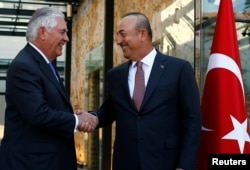Turkey has deployed warships to Cypriot waters in the latest escalation over contested gas exploration rights.
“Turkey is determined to protect both its own rights and interests in its continental shelf and to continue its support to the Turkish Cypriot side,” said a toughly worded statement by the Turkish Foreign Ministry late Thursday.
Two Turkish frigates and a submarine are reportedly monitoring the exploration ship West Capella. The ship, contracted by France's Total and Italy's ENI, started drilling on July 12 under an exploration license granted by the Greek Cypriot government. Since 1974, Cyprus has been divided between Greek and Turkish Cypriot communities after a Turkish invasion following a Greek-inspired coup.
The Greek Cypriot administration is the only internationally recognized government, but Ankara maintains the Turkish Cypriots must have a say in the exploration and development of what is believed to be the island's considerable energy resources.
“We cannot remain indifferent to these kinds of unilateral actions,” warned Turkish Foreign Minister Mevlüt Cavusoglu at a press conference Thursday. “At the moment, we are planning the steps we will take with our Energy Ministry.”
Greek Cypriot reaction unclear
Nicosia sought to play down tensions. “We are prepared for various scenarios," said Greek Cypriot Energy Minister George Lakkotrypis. “Our perception is that Turkey will continue to challenge us one way or the other,” he said, adding, “It is more appropriate to focus on what we do, and the best answer is to keep a low tone and respond, through our actions at sea.”
How the Greek Cypriots will react at sea remains unclear. The Greek Cypriot side, which is a member of the European Union, is seen to be in a diplomatically powerful position. Greek Prime Minister Alexis Tsipras, a close ally, gave unequivocal support to Nicosia this week, dismissing Turkish threats toward the Greek Cypriots.
“I remember a saying that I always keep in my mind, that the best guard dog is not the one that barks … good guard dogs don't need to bark,” Tsipras said Thursday. “We don't bark that much, but, I believe, we effectively defend our country's sovereign rights.”
Turkey's Foreign Ministry dismissed the remarks, saying top Greek politicians should “show a responsible stance in issues regarding Turkey.”
Both sides need to benefit
The dispute over exploiting the island's gas reserves threatens to embroil international energy giants. “Energy companies who involve themselves in irresponsible steps taken by the Greek Cypriot side can never be met with understanding,” said Turkish President Recep Tayyip Erdogan at the World Petroleum Conference in Istanbul. “They could lose a friend in Turkey.”
“Turkey made it clear on every occasion these energy resources around the island, they are the resources of both sides," said former Turkish Ambassador Mithat Rende, who is an expert on eastern Mediterranean energy issues. “They [Greek and Turkish Cypriots] have to sit together and have to probably establish a committee on how to benefit from the resources. The Turkish side made clear that what is unilaterally done is totally unacceptable.”
Observers point out the Greek Cypriots may be reluctant to take such a step, as it could be viewed as a move toward legitimizing the Turkish Cypriot administration and undermining Nicosia's sole status as the only internationally recognized government.
The risk of direct confrontation over the current gas exploration is minimized because it is being carried out in waters off the Greek Cypriot side of the island. Future explorations carry greater risks. "The Turkish Cypriots have licensed blocks [areas of sea] to a Turkish petroleum company to explore, and these blocks overlap areas being explored by the Greek Cypriots,” said Rende.
Both sides being blamed
The growing dispute over energy exploration erupted days after the collapse of U.N.-backed reunification talks. Already Ankara is crying foul. “Instead of focusing on a solution, they have launched an exploration in a bid to provoke these talks. It's because of their insincerity that the 10-day-long talks did not lead to any results,” Cavusoglu said.
Both sides are engaged in blaming one another for the failure of the talks. The Mediterranean island's massive energy potential had been touted as a powerful incentive to unification efforts, but now it only threatens to exacerbate divisions.
“While the oil and gas in the region in the eastern Mediterranean and the discoveries are very important, and to have Turkey as an outlet for this to Europe is very important to Ankara, there has to be a political settlement [on Cyprus] before the economic side benefits kick in,” said veteran Cyprus watcher Semih Idiz, a columnist with Turkey's Al-Monitor website.












